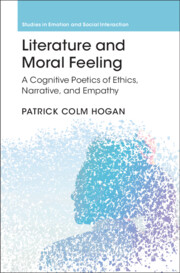Book contents
- Literature and Moral Feeling
- Studies in Emotion and Social Interaction
- Literature and Moral Feeling
- Copyright page
- Dedication
- Contents
- Figures
- Acknowledgments
- Introduction:
- Chapter 1 Defining Ethics
- Chapter 2 The Implied Ethics of Julius Caesar
- Chapter 3 Narrative Universals, Emotion, and Ethics
- Chapter 4 Ethics and Narrative Genre:
- Chapter 5 Emotion and Empathy
- Chapter 6 The Dynamics of Empathic Response:
- Chapter 7 Evaluating Empathy
- Chapter 8 The Critical Empathy of Angels in America
- Afterword:
- References
- Index
- Studies in Emotion and Social Interaction
Afterword:
The Limits of Ethics: On Free Will and Blame
Published online by Cambridge University Press: 21 April 2022
- Literature and Moral Feeling
- Studies in Emotion and Social Interaction
- Literature and Moral Feeling
- Copyright page
- Dedication
- Contents
- Figures
- Acknowledgments
- Introduction:
- Chapter 1 Defining Ethics
- Chapter 2 The Implied Ethics of Julius Caesar
- Chapter 3 Narrative Universals, Emotion, and Ethics
- Chapter 4 Ethics and Narrative Genre:
- Chapter 5 Emotion and Empathy
- Chapter 6 The Dynamics of Empathic Response:
- Chapter 7 Evaluating Empathy
- Chapter 8 The Critical Empathy of Angels in America
- Afterword:
- References
- Index
- Studies in Emotion and Social Interaction
Summary
Since half of this book is devoted to advocating a particular ethical attitude, readers might reasonably conclude that the author feels ethical evaluation is a very good thing. In fact, I believe it is often (though not invariably) good when aimed at one’s own actions, but almost always a fairly bad thing when aimed at other people’s actions. To make matters worse, we appear to have a greater inclination toward the latter than toward the former. This brief afterword turns from descriptive and normative ethics to a third form of ethical study, metaethics. In it, I summarize arguments bearing on the very idea of free will, maintaining that it is a plausible notion only from a first-person perspective on a necessarily incompletely described world. That view of free will entails that, in general, ethical blame should be very narrowly restricted to the first-person perspective. Indeed, with regard even to oneself, it is confined to the present and future.
- Type
- Chapter
- Information
- Literature and Moral FeelingA Cognitive Poetics of Ethics, Narrative, and Empathy, pp. 260 - 271Publisher: Cambridge University PressPrint publication year: 2022

